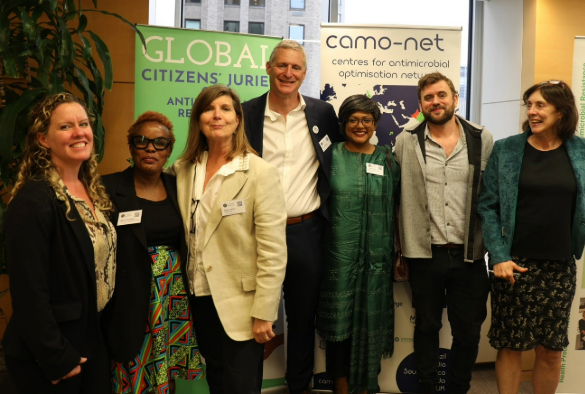Postcard: joining a global commitment to reduce deaths linked to AMR by 10% before 2030

Professor Alison Holmes OBE, CAMO-Net lead and the University of Liverpool’s David Price Evans Chair in Global Health and Infectious Diseases recently travelled to New York City to join the United Nations General Assembly (UNGA) high-level meeting on antimicrobial resistance (AMR). CAMO-Net is the Centres for Antimicrobial Optimisation Network:
I began my week by attending the opening performance of Lifeline: The Musical at the Alice Griffin Jewel Box Theatre. The performance’s aim was to bring public attention to the issue. The evening included a thought-provoking panel discussion, followed by the performance of Lifeline itself. It’s no exaggeration to say that the performance was extremely moving. When we read about AMR in the press, it is often about a seemingly abstract issue, but this performance brought AMR’s real-world impact to life.
Some of the cast of Lifeline joined us the next day at the Carnegie Foundation, where my international colleagues from CAMO-Net took part in ‘Improving Global AMR Awareness and Action through Innovative Education and Public Engagement’. Dame Louise Richardson, President of the Carnegie Foundation opened the event, which was introduced by Lord Darzi of Denham. With stakeholders from across the world showcasing their work, there were some incredibly valuable discussions on how public engagement can be scaled up to increase awareness of AMR. We explored examples from Uganda, Bangladesh, Brazil, and South Africa, where programmes of engaging communities provide much opportunity for shared learning. One compelling initiative involves our CAMO-Net colleagues in Uganda, who leverage the rich cultural traditions of dance and song, specific to different regions, to effectively convey key messages to local communities, building on experience in addressing HIV and TB. Examples of the active involvement of women in the community and women in research taking place in Bangladesh were also shared. I was delighted to chair the panel discussions and was able to share insights from CAMO-Net’s ongoing initiatives.
On Tuesday, I attended ‘Advancing Together: Securing the Global AMR Agenda by Harnessing the Collective Strength of Multi-Sector Partnerships’. It was an opportunity to hear H.E. Mia Amor Mottley speak, PM of Barbados and Chair of the Global Leaders Group on AMR. This event was particularly interesting as it focused on how we can bring together sectors such as human health, animal health, and environmental stakeholders to create sustainable solutions to AMR, something we at the University of Liverpool recognise and are particularly well-placed to contribute to through our interdisciplinary research.
Later that same day, I participated in, ‘Disruptive Innovation in AMR: A Collaborative Approach to Change’ where I was interviewed by John-Arne Rottingen, CEO of the Wellcome Trust. This was the Fleming Initiative’s major offering at UNGA, and it focused on public engagement and policy. I was able to discuss the need for better representation of women, and how we can drive meaningful research and change through partnerships. Our CAMO-Net collaboration is a pertinent example of this approach.
Wednesday brought another key discussion, held in the UN building, hosted by the Pan-American Health Organization, the South-East Asia Regional Office of WHO, and the Wellcome Trust, where we examined how to create equitable pathways for implementing the 2024 AMR Declaration. These conversations were particularly focused on ensuring that low- and middle-income countries are not left behind as we advance global action on AMR. CAMO-Net is somewhat of a flagship programme for Wellcome and is the first of its kind to be funded with this equitable philosophy in mind. Our collaboration was a much referenced example of how we might implement the 2024 AMR Declaration. It was a pleasure to meet the Minister of Health from Timor-Leste, Dr Élia António de Araújo dos Reis Amaral, who is a lead AMR in the country and represents a collaboration of the South-East Asian Region Office of the World Health Organization.
The commitment from across sectors and regions has been incredibly encouraging, and it’s clear that the University of Liverpool’s leadership in AMR research and policy is recognised on a global stage.
The UN’s high-level meeting concluded the week. At this important event, a new political declaration on AMR was signed by 193 member states. It calls for scaled-up action across sectors including farming, pharmaceutical manufacture, environmental protection and healthcare. This declaration is cause for some optimism. There is much work ahead of us, and now is the time to turn our words into action.
You can read more about the Wellcome funded CAMO-Net collaboration on the CAMO-Net website.
Photo: L-R CAMO-Net members Kerri Hill-Cawthorne, Mercy Kukundakwe, Professor Alison Holmes, Professor Marc Mendelson, Dr Senjuti Saha, Chris Deputy, Professor Anna Levin